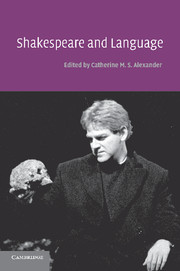Book contents
- Frontmatter
- Contents
- List of contributors
- Editor's note
- 1 Shakespeare and language: an introduction
- 2 Shakespeare's language and the language of Shakespeare's time
- 3 The foundations of Elizabethan language
- 4 Shakespeare's talking animals
- 5 Some functions of Shakespearian word-formation
- 6 Shakespeare and the tune of the time
- 7 Shakespeare's Romeo and Juliet: the places of invention
- 8 Shakespeare's thematic modes of speech: Richard II to Henry V
- 9 Hamlet and the power of words
- 10 The art of the comic duologue in three plays by Shakespeare
- 11 Hamlet's ear
- 12 ‘Voice potential’: language and symbolic capital in Othello
- 13 The aesthetics of mutilation in Titus Andronicus
- 14 ‘Time for such a word’: verbal echoing in Macbeth
- 15 Household words: Macbeth and the failure of spectacle
- 16 Late Shakespeare: style and the sexes
- Index
3 - The foundations of Elizabethan language
Published online by Cambridge University Press: 15 December 2009
- Frontmatter
- Contents
- List of contributors
- Editor's note
- 1 Shakespeare and language: an introduction
- 2 Shakespeare's language and the language of Shakespeare's time
- 3 The foundations of Elizabethan language
- 4 Shakespeare's talking animals
- 5 Some functions of Shakespearian word-formation
- 6 Shakespeare and the tune of the time
- 7 Shakespeare's Romeo and Juliet: the places of invention
- 8 Shakespeare's thematic modes of speech: Richard II to Henry V
- 9 Hamlet and the power of words
- 10 The art of the comic duologue in three plays by Shakespeare
- 11 Hamlet's ear
- 12 ‘Voice potential’: language and symbolic capital in Othello
- 13 The aesthetics of mutilation in Titus Andronicus
- 14 ‘Time for such a word’: verbal echoing in Macbeth
- 15 Household words: Macbeth and the failure of spectacle
- 16 Late Shakespeare: style and the sexes
- Index
Summary
This goodly speech
‘We speak the tongue that Shakespeare spake’ is a figure of speech rather than a statement of fact, and it has an ironic flavour in these days of the retranslation of the Authorized Version. It can imply that kinship which Shakespeare's Queen phrased memorably, in the common idiom of her day, when she declared herself to be ‘mere English’ but no one is likely to be ‘so bold or daring hardy’ as to claim parity of esteem for the impoverished and diminishing vocabulary of our familiar speech, if they agree with H. C. Wyld that ‘“the tongue that Shakespeare spake” was the tongue which he wrote’. We know what it sounded like on the stage of the Globe, and that in spite of differences in pronunciation Shakespeare's English, unlike Chaucer's, is ‘modern’. Nevertheless, its vocabulary and rhythms apparently seemed remote enough to that sensitive artist, the late Rose Macaulay, to make her say she could never write a novel set in a period earlier than the seventeenth century, ‘because the language they talked was just too different from ours to make easy dialogue which wouldn't sound affected’. She was discussing More's Dialogue of Comfort against Tribulation and, passing over Elizabeth's reign and omitting Shakespeare from her argument, referred specifically to the early 1500s when she said, ‘there is much less available of colloquial talk and one doesn't quite hear them talking’:
By the seventeenth century this isn't so. And there is such a mass of letters, diaries, memoirs, plays, essays, of this period that one can soak oneself in the language and easily reproduce it.
- Type
- Chapter
- Information
- Shakespeare and Language , pp. 44 - 67Publisher: Cambridge University PressPrint publication year: 2004



